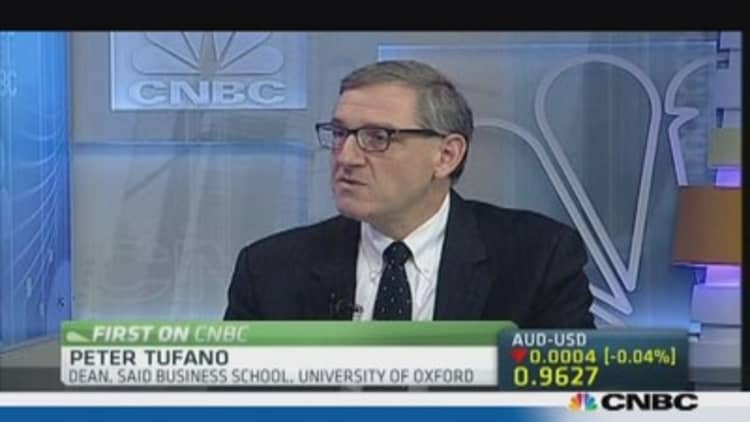
Are you thinking about a business degree? Are you worried about the cost? Relax. A number of top business schools are now doling out substantial quantities of financial aid.
So says a new survey of business school financial aid offers by the business education website Poets & Quants, which found that the top 25 business schools are awarding an estimated $232.7 million in grants in the current school year. At Rice University, about 94 percent of students are receiving some financial aid, for example. And Harvard Business School is giving away about $31.5 million, spread among 65 percent of its 1,868 students, according Poets & Quants.
"Every one of [these schools] is discounting, and some of them are discounting fairly aggressively," said John Byrne, editor in chief of Poets & Quants, adding that "the scholarship game has really heated up" over the past five years.
UCLA's Anderson School of Management more than doubled its funding from $5.8 million to $12.1 million in the last five years, for example, and the average grant awarded by Washington University's Olin Business School rose from $26,200 to $31,328.
But the financial aid largesse is not limited to the top schools. According to the Graduate Management Admission Council, 96 percent of full-time, two-year MBA programs offered financial aid in the 2013-2014 year. (Those awards may help offset some of the increase in business school tuition: The Association to Advance Collegiate Schools of Business reports that tuition rose an average of 23.2 percent for North American business schools between the 2007-08 and 2011-12 academic years.)
While business schools may be offering more grants, aid from individual schools is just one form of financial assistance available. Employers will sometimes subsidize an MBA candidate's education if they commit to returning after graduation. Sallie Mae, Nellie Mae and others offer financial aid as well, and MBA candidates generally have little trouble taking out loans because their earnings prospects are so rosy.
Both Harvard and Stanford say they award financial aid based solely on need, and they refuse to negotiate with students who have received larger grants from other schools. (Fifty-two percent of Stanford Graduate School of Business students are receiving financial aid with an average grant amount of $35,830, according to Poets & Quants.) But many other MBA programs take a very different tack, Byrne said. For them, financial aid is often a tool to lure stronger students than they might otherwise attract, thereby moving themselves up in business school rankings and drawing alumni donations.
"If you've got what it takes, regardless of whether you need the money, you will get the money because the school wants you that badly. If you are willing to settle for a slightly lower school in terms of rank, you will get that money," he said. "This is money aimed at convincing a kid to go to a school."
Read MoreGot student debt? You may be overpaying
Byrne pointed to a student with an impressive 760 score on the Graduate Management Admission Test who was admitted to MIT's Sloan School of Management with all costs covered. Wharton then offered her the same financial deal, and she wound up accepting that offer, he said.
Read More
Alison Davis-Blake, dean of the University of Michigan's Ross School of Business, told Poets & Quants that the money battles for the best students feels like "a nuclear arms race."
That may be. But if you are a strong enough candidate, you can make that arms race work for you.

